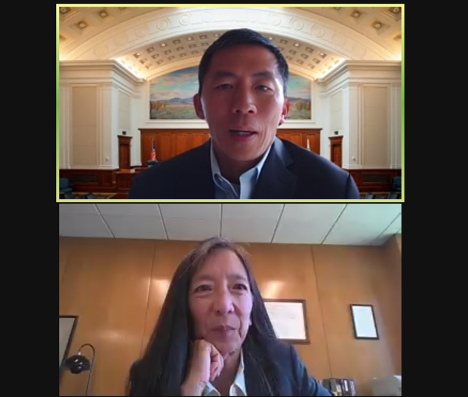Identity and Action in Challenging Times
| For Immediate Release: December 6, 2022 | Contact: Priya Purandare, Executive Director |
The National Asian Pacific American Bar Association (NAPABA), in collaboration with the American Bar Foundation, is proud to announce the release of A Portrait of Asian Americans in the Law 2.0: Identity and Action in Challenging Times (Portrait Project 2.0). Building on the results of the original Portrait Project report published in 2017, this five-year follow-up study provides comprehensive data and analysis on the progress and experiences of Asian Americans in the legal profession.
“Portrait Project 2.0 is a crucial resource for lawyers, policymakers, researchers, and advocates seeking to advance diversity in the legal profession,” said Sandra Leung, president of NAPABA. “By spotlighting the experiences of Asian American attorneys, this new report calls attention to our community’s successes and challenges, and provides troves of data that will inform efforts to promote equity and inclusion in a variety of sectors and organizations. We are proud that this report quantifies the advances we have made on the bench and in the C-Suite. However, we recognize that Asian Americans remain underrepresented in the highest ranks of law firms, education, and in public service and commit to investing in career development in those sectors.”
“The findings of Portrait Project 2.0 highlight the importance of NAPABA’s ongoing work to develop innovate programs to help attorneys at all stages of their career lifecycle, from law school to retirement, to advance and find personal fulfillment in their profession,” said Priya Purandare, executive director of NAPABA. “As we learned five years ago, legal employers and legal networks must make more strategic investments in supporting Asian American attorneys by facilitating relationship-building, helping young lawyers develop soft skills, and providing leadership opportunities. Further, they must invest in meaningful interventions that combat institutional bias and stereotypes. This report underscores the opportunity top organizations across sectors have to attract and retain top-talent by creating supportive and value driven cultures.”
The 77-page report — authored by Tyler Dang, Katherine Fang, Benji Lu, Michael Tayag, and California Supreme Court Justice Goodwin Liu — combines detailed analysis of employment data in various legal sectors with qualitative insights from focus groups and results of a wide-ranging national survey completed by over 700 Asian American lawyers.
This five-year update offers fresh insights into Asian American career advancement and political participation against the backdrop of a rise in anti-Asian hate. Among the key findings:
- Asian American attorneys indicated greater engagement with social and political issues. Those seeking to change practice settings ranked a desire to advance issues important to them among their most significant reasons for doing so. This was ranked among the least significant reasons in 2016.
- 47% of survey respondents reported having become more involved in community organizations, protests, or other forms of advocacy on behalf of Asian Americans since March 2020, suggesting recent societal events may be influenced this behavior.
- There has been progress in the appointment of federal judges and in the ranks of general counsel. The number of Asian American federal judges has increased over the past five years, comprising 6% of active federal judges compared to 3.4% in 2016.
- Underrepresentation of Asian Americans in the top ranks of the legal profession persists. Asian Americans are the largest minority group at major law firms, but they have the lowest ratio of partners to associates — and the highest attrition rate. Further, they remain underrepresented among law clerks, law professors, state court judges, and state and federal prosecutors.
- Asian American attorneys would likely benefit from greater institutional supports that counteract stereotypes and facilitate relationship-building and leadership opportunities.
NAPABA thanks Justice Goodwin Liu and the American Bar Foundation for their continued partnership, support, and investment in our vision of a community where Asian Pacific Americans achieve representation, success, and influence within the legal profession and beyond.
#
The National Asian Pacific American Bar Association (NAPABA), represents the interests of over 60,000 Asian Pacific American (APA) legal professionals and nearly 90 national, state, and local APA bar associations. NAPABA is a leader in addressing civil rights issues confronting APA communities. Through its national network, NAPABA provides a strong voice for increased diversity of the federal and state judiciaries, advocates for equal opportunity in the workplace, works to eliminate hate crimes and anti-immigrant sentiment, and promotes the professional development of people of all backgrounds in the legal profession.
NAPABA | 1612 K St. NW, Suite 300 | Washington, DC 20006 | www.napaba.org


